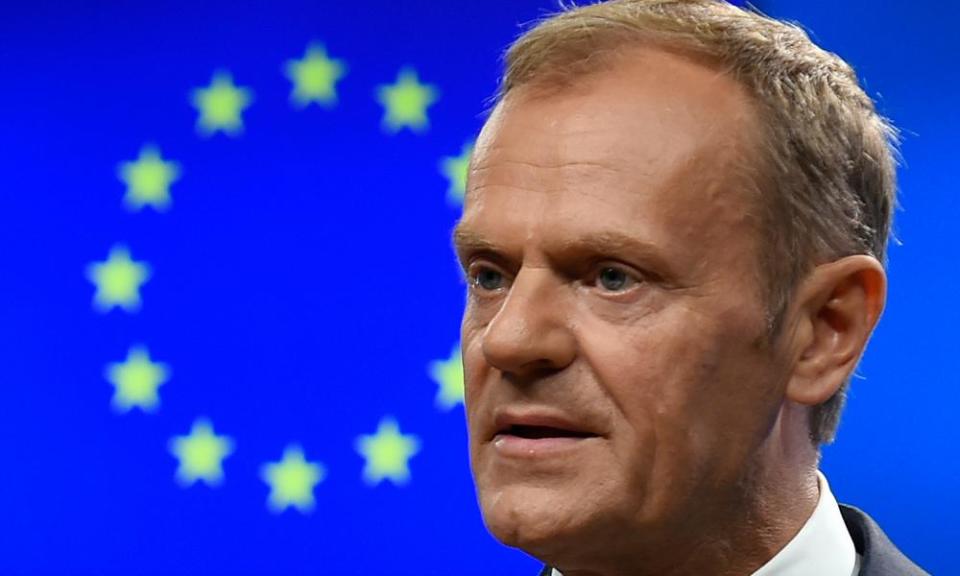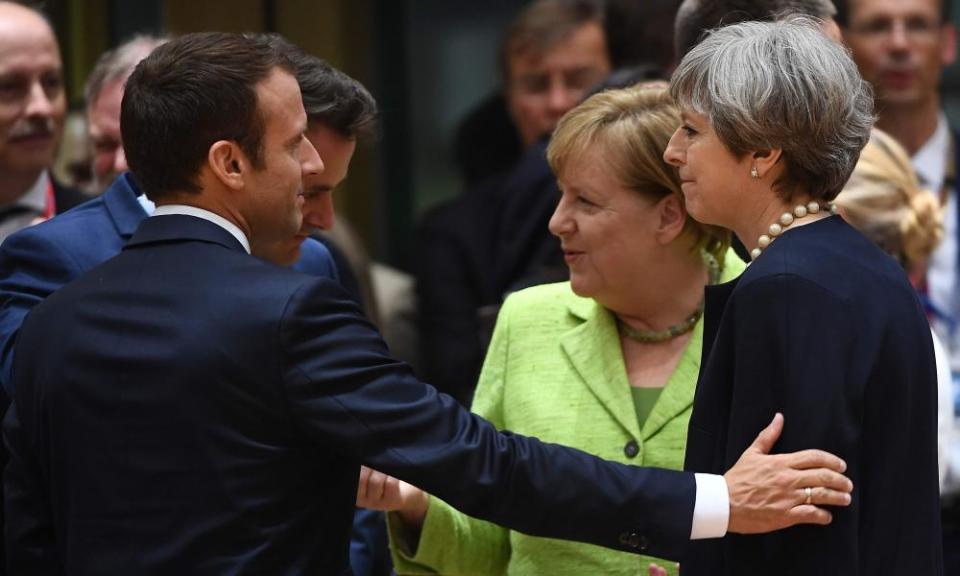Donald Tusk echoes John Lennon to suggest UK could stay in EU

Donald Tusk has used the first summit of EU leaders since the start of the Brexit negotiations to suggest that there is a chance the UK could still remain a member, and has quoted John Lennon to make his point.
In a statement ahead of the meeting in Brussels, the president of the European council deployed the lyrics of Imagine to express his hope – however unlikely – that Britain could change its mind. “We can hear different predictions, coming from different people, about the possible outcome of these negotiations: hard Brexit, soft Brexit or no deal,” Tusk said, of what he described as a difficult process.
“Some of my British friends have even asked me whether Brexit could be reversed, and whether I could imagine an outcome where the UK stays part of the EU.
“I told them that in fact the European Union was built on dreams that seemed impossible to achieve. So, who knows? You may say I’m a dreamer, but I am not the only one.”
A No 10 spokesman said in response: “Britain voted to leave the EU on 23 June last year and, as we have been clear all along, we will be delivering the democratic will of the British people.”
The Belgian prime minister, Charles Michel, tweeted: “It’s time for action and certainty. Not for dreams and uncertainty.”
Arriving at the summit, the German chancellor, Angela Merkel, and the French president, Emmanuel Macron, said that their priority at the meeting was to talk about the future of the EU, rather than Brexit.

In response to Downing Street’s plan to provide an overview of its offer on EU citizens over dinner at the summit, the European commission president, Jean-Claude Juncker, said: “I’m not negotiating here.”
Arriving at the summit, Theresa May nevertheless insisted she would be raising the issue with leaders, before she left the 27 member states to talk between themselves. She said: “What I’m going to be setting out today is clearly how the UK proposes to protect the rights of EU citizens in the UK, and see the rights of UK citizens living in Europe protected.
“That’s been an important issue: we’ve wanted it to be one of the early issues that was considered in the negotiations. That is now the case – that work is starting. We will be setting out how we propose to ensure that EU citizens living in the UK have their rights protected in the United Kingdom.”
There are significant differences between the UK and the EU on the issue, which were plain on the first day of formal negotiations on Monday, when experts from the UK and the EU had some preliminary talks.
The EU wants all rights currently enjoyed by EU nationals in the UK, and British nationals on the continent and in Ireland, to be protected in perpetuity, as long as they arrived in their adopted homes before Britain leaves the bloc at midnight Brussels time on 29 March 2019.
The UK is likely to suggest a less generous position under which EU nationals residing in Britain are guaranteed the same rights as UK nationals. That would mean that future post-Brexit changes in laws affecting British citizens, including in relation to the ability of a spouse from abroad to join them in the UK, would affect EU citizens as well, leaving them potentially in a worse legal position than they are today.
The British government also opposes the EU’s insistence that the European court of justice, from whose jurisdiction May has said she will remove the UK, should be the arbiter of any future disputes involving the holders of those rights. The UK additionally is thought to believe any deal should only apply to EU nationals who moved to the UK before March this year, when the British government triggered article 50 notifying the EU of its intention to leave.
However a crack appeared in the EU’s unity over the issue, when Lithuania’s president, Dalia Grybauskaite, suggested on arrival at the summit that it was up to the UK to decide on the so-called cutoff date and whether it accepted the jurisdiction of the European court of justice.
She said: “We need to think about the future and the sooner we settle the future the better for all of us ... For us the cutoff date is not so important ... It is up to Britain to decide how much they involve the EU judiciary.”

 Yahoo News
Yahoo News 